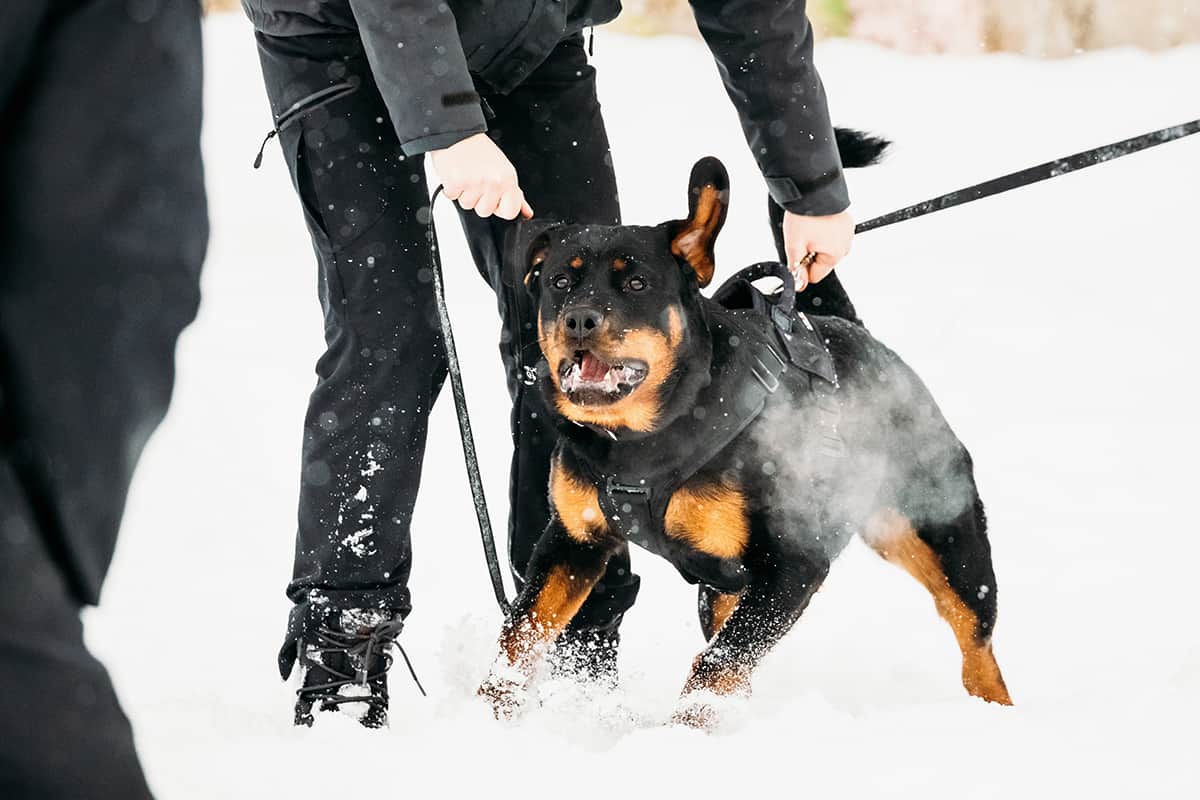Rottweilers are often known for their robust and protective nature. They’re big, strong, and have a reputation for being aggressive. But have you ever wondered why? Well, in this article, we’re going to dive into the fascinating topic of why Rottweilers can sometimes display such aggressive behavior. So, if you’ve ever found yourself pondering, “Why does the Rottweiler get so aggressive?” stick around, because we’ve got the answers for you!
Now, let’s be clear – not all Rottweilers are aggressive. In fact, many are friendly, loyal, and gentle family pets. However, it’s important to understand that the potential for aggression in Rottweilers stems from several factors, including their genetics, training, and environment. So, if you’re curious about why some Rottweilers tend to exhibit more aggression than others, you’re in the right place!
In this article, we’ll explore the role of genetics in a Rottweiler’s temperament, the importance of proper training and socialization, and how their environment can contribute to their behavior. So, whether you’re a Rottweiler owner or simply interested in learning more about these magnificent dogs, let’s get ready to uncover the reasons behind their sometimes aggressive tendencies!

Why Does a Rottweiler Become Aggressive?
When it comes to dog breeds, Rottweilers often have an unjustified reputation for being aggressive. However, it’s important to understand that aggression in Rottweilers is not innate but rather a result of various factors, including genetics, socialization, training, and environment. It is crucial to approach this topic with an open mind and not judge the entire breed solely based on isolated incidents or misconceptions. In this article, we will delve into the reasons behind a Rottweiler’s aggressive behavior and offer insights into how to handle and prevent such behavior in a responsible manner.
Rottweiler Temperament and Aggression
Understanding the temperament of a Rottweiler is key to comprehending why they may display aggressive behavior. Rottweilers have historically been bred to be protective and self-assured, making them naturally confident and aloof towards strangers. This inherent guarding instinct can be misconstrued as aggression, especially if not appropriately managed and channeled from a young age.
With their intelligence, loyalty, and strong work drive, Rottweilers thrive in roles such as police work, search and rescue, and service dogs. However, these same qualities can contribute to behavioral issues if their mental and physical needs are not met. A Rottweiler that feels bored, neglected, or lacks proper socialization is more likely to exhibit aggressive tendencies.
To prevent aggression, it is crucial to provide a Rottweiler with early socialization, consistent training, and mental stimulation. Positive reinforcement techniques and a loving, calm, and assertive owner can go a long way in shaping a Rottweiler’s behavior and preventing aggressive tendencies from developing.
The Role of Genetics in Rottweiler Aggression
Genetics play a significant role in a dog’s predisposition to aggression. While aggression is not exclusive to Rottweilers, some individuals may have a genetic inclination towards displaying aggressive behavior. However, it’s important to note that not all Rottweilers will exhibit aggression, and responsible breeding practices can help minimize the occurrence of aggressive traits.
When selecting a Rottweiler from a breeder, it is essential to choose one who prioritizes temperament and health in their breeding program. Reputable breeders carefully select breeding pairs with balanced temperaments and conduct appropriate health screenings to reduce the chances of hereditary issues that may contribute to aggression.
Properly socializing and training a Rottweiler from a young age can help mitigate any genetic predispositions towards aggression. Early exposure to various stimuli, positive experiences with other dogs and people, and consistent reinforcement of desirable behaviors are crucial for shaping a Rottweiler’s temperament and minimizing aggressive tendencies.
Environmental Factors and Aggression in Rottweilers
Environmental factors can greatly influence a Rottweiler’s behavior, including the potential for aggression. Factors such as past trauma, abuse, neglect, or inconsistent handling can lead to fear-based aggression or defensive behavior in Rottweilers.
Rottweilers, like any other dog, require a stable and nurturing environment to thrive. An unstable or abusive living situation can cause anxiety, fear, and aggression in Rottweilers. Providing a safe and secure home, positive reinforcement, and routine can help alleviate stress and promote a well-adjusted Rottweiler.
Additionally, it’s important to note that individual experiences and past traumas can significantly impact a Rottweiler’s behavior. If a Rottweiler has been mistreated or exposed to negative experiences in their past, rehabilitative efforts, along with patience and understanding, can help them overcome their aggression and develop trust and confidence.
Training and Socialization for a Well-Behaved Rottweiler
To prevent aggression in Rottweilers, training and socialization are of utmost importance. Early socialization exposes Rottweilers to various people, animals, and environments, ensuring they grow up to be adaptable and well-rounded dogs.
It is essential to reinforce positive behaviors through reward-based training methods. Harsh punishments or physical corrections can lead to fear and aggression in Rottweilers. Instead, training sessions focused on positive reinforcement, consistency, and appropriate boundaries will yield the best results.
Engaging in activities that stimulate a Rottweiler’s mind, such as puzzle games or obedience training, can help channel their energy and prevent the development of aggressive behavior due to boredom or frustration. Regular exercise, both physical and mental, is crucial for a well-behaved, balanced Rottweiler.
The Importance of Responsible Ownership
Thus, to avoid aggressive behavior in Rottweilers, responsible ownership is paramount. Ensuring a Rottweiler is well-bred, properly socialized, and receives adequate training and mental stimulation from the start can greatly reduce the chances of aggression.
Moreover, nurturing a loving and respectful relationship with your Rottweiler based on trust, consistency, and clear communication is essential. A well-behaved Rottweiler is a reflection of responsible ownership, and by being a responsible owner, you contribute to breaking the stereotypes and misconceptions surrounding this magnificent breed.
Remember, aggression should never be tolerated or encouraged in any dog breed. If you are experiencing difficulties with your Rottweiler’s aggressive behavior, consult a professional dog trainer or behaviorist who can provide personalized guidance and support to help you and your Rottweiler overcome these challenges and build a harmonious relationship based on trust and respect.
Conclusion
Aggression in Rottweilers is often a result of various factors, including genetics, socialization, training, and environment. Understanding these factors and taking appropriate measures to prevent or address aggression is crucial for responsible ownership. By providing a Rottweiler with love, attention, consistent training, and a nurturing environment, you can help them develop into well-rounded and balanced dogs.
Remember, each Rottweiler is an individual, and assuming all Rottweilers are aggressive based on stereotypes is unfair and untrue. Through responsible ownership and education, we can break down misconceptions surrounding this wonderful breed and promote a better understanding of Rottweilers as loyal, loving, and well-behaved companions.
Key Takeaways: Why is the Rottweiler very aggressive?
- Rottweilers can be aggressive due to improper socialization and training.
- Genetic factors can contribute to the aggression in Rottweilers.
- Poor breeding practices can result in aggressive behavior.
- Fear or feeling threatened can trigger aggression in Rottweilers.
- Lack of exercise and mental stimulation can lead to pent-up energy and aggression.
Frequently Asked Questions
Are you curious about why Rottweilers can sometimes display aggressive behavior? Read on to find the answers to your questions!
What are some reasons why Rottweilers can be aggressive?
Aggression in Rottweilers can be attributed to various factors, including genetics, socialization, and training. Some Rottweilers may have a genetic predisposition towards aggression due to selective breeding practices in the past. Additionally, if a Rottweiler hasn’t been properly socialized or trained, it may behave aggressively out of fear or uncertainty. It’s crucial to understand that not all Rottweilers are naturally aggressive, and their behavior can be influenced by how they are raised and trained.
To prevent aggression in Rottweilers, it’s essential to provide proper socialization from a young age. This involves exposing them to different people, animals, and environments in a positive and controlled manner. Consistent and positive reinforcement training is also crucial. It helps establish clear boundaries and teaches them appropriate behaviors. By addressing these factors, aggression in Rottweilers can be minimized and managed.
How can I prevent my Rottweiler from becoming aggressive?
Preventing aggression in Rottweilers starts with early socialization and consistent training. Introduce your Rottweiler to various situations, people, and animals when they’re young so they can learn to feel at ease in different environments. It’s important to expose them to positive experiences and rewards, helping them associate new situations with positive outcomes.
Establishing clear boundaries and rules through obedience training is essential. Consistency is key: use positive reinforcement techniques such as rewards and praise to reinforce good behavior. Avoid harsh punishments, as they can lead to fear and aggression. Providing mental and physical exercise is also crucial to prevent behavioral issues. A well-exercised and stimulated Rottweiler is less likely to exhibit aggression or destructive behavior.
Can aggression in Rottweilers be cured?
While aggression in Rottweilers can be managed, it’s important to note that complete “cure” is not always possible. Aggressive behavior is influenced by various factors, including genetics, early experiences, and training. However, with proper management, therapy, and training, aggression can be minimized or redirected.
Consulting a professional dog behaviorist or trainer who specializes in aggression can be beneficial. They can evaluate the specific factors contributing to aggression and create a tailored behavior modification plan. This may involve desensitization and counterconditioning techniques to help the Rottweiler become more comfortable and less reactive in certain situations. With patience, consistency, and professional guidance, positive changes can be achieved.
Are Rottweilers inherently aggressive towards humans?
No, Rottweilers are not inherently aggressive towards humans. Like any breed, individual temperament can vary. However, Rottweilers are known for their loyalty, intelligence, and protective instincts. With proper socialization, training, and responsible ownership, Rottweilers can be loving and gentle companions. Aggression towards humans is more likely to be a result of inadequate socialization, poor training, or mistreatment.
Rottweilers can be excellent family dogs when raised in a loving and stimulating environment. Early exposure to different people, including children, helps them learn appropriate behavior and builds their confidence. Responsible ownership, which includes providing physical and mental stimulation, is crucial in shaping a Rottweiler’s behavior towards humans in a positive way.
Should I be concerned if my Rottweiler shows signs of aggression?
If your Rottweiler displays signs of aggression, it’s important to address the issue promptly and seek professional guidance. Aggression can escalate and become a safety concern if left unaddressed. Consulting with a qualified dog behaviorist or trainer who specializes in aggression can help assess the situation and create a behavior modification plan.
It’s crucial to avoid punishment-based methods and instead focus on positive reinforcement techniques that encourage desirable behavior. Early intervention is key to minimize aggressive behavior and ensure a happy and well-adjusted Rottweiler. With appropriate training, management, and professional support, many Rottweilers can overcome aggression and lead fulfilling lives.

Summary
Rottweilers can be aggressive due to various factors such as genetics, lack of socialization, and mistreatment. Their natural protective instinct and strong territorial nature can also contribute to their aggressive behavior. It is important for owners to provide proper training, socialization, and a loving environment to prevent aggression in Rottweilers.
It’s crucial to remember that aggression is not inherent to all Rottweilers. With responsible ownership and proper training, these dogs can be loyal, friendly, and well-behaved companions. Understanding the factors that contribute to aggression and addressing them early on can help ensure a positive and safe interaction with Rottweilers.
